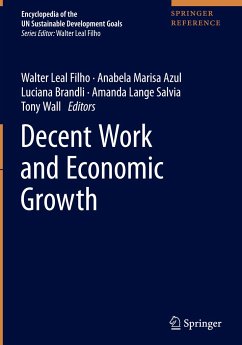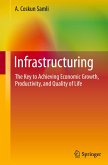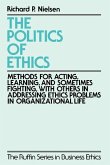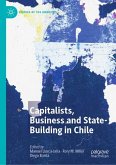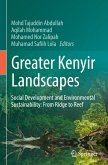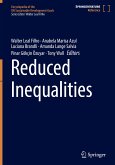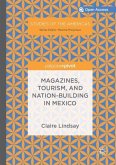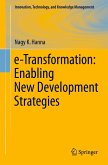The problems related to the process of industrialisation such as biodiversity depletion, climate change and a worsening of health and living conditions, especially but not only in developing countries, intensify. Therefore, there is an increasing need to search for integrated solutions to make development more sustainable. The United Nations has acknowledged the problem and approved the "2030 Agenda for Sustainable Development". On 1st January 2016, the 17 Sustainable Development Goals (SDGs) of the Agenda officially came into force. These goals cover the three dimensions of sustainable development: economic growth, social inclusion and environmental protection.
The Encyclopedia of the UN Sustainable Development Goals comprehensively addresses the SDGs in an integrated way. The Encyclopedia encompasses 17 volumes, each one devoted to one of the 17 SDGs.
This volume addresses SDG 8, namely "Promote sustained, inclusive andsustainable economic growth, full andproductive employment and decent work for all" and contains the description of a range of terms, to allow a better understanding and foster knowledge. The predominant economic model is promoting a lopsided economic growth that is further increasing the gap between the have and the have-nots. This SDG is not just proposing the attainment of more just and empowering economic models, but it also puts at the forefront the well-being of workers by striving to provide employment and better working conditions that respect the dignity of workers.
Concretely, the defined targets are:Sustain per capita economic growth in accordance with national circumstances and, in particular, at least 7 per cent gross domestic product growth per annum in the least developed countriesAchieve higher levels of economic productivity through diversification, technological upgrading and innovation, including through a focus on high-value added and labour-intensive sectorsPromote development-oriented policies that support productive activities, decent job creation, entrepreneurship, creativity and innovation, and encourage the formalization and growth of micro-, small- and medium-sized enterprises, including through access to financial servicesImprove progressively, through 2030, global resource efficiency in consumption and production and endeavour to decouple economic growth from environmental degradation, in accordance with the 10-Year Framework of Programmes on Sustainable Consumption and Production, with developed countries taking the leadAchieve full and productive employment and decent work for all women and men, including for young people and persons with disabilities, and equal pay for work of equal valueSubstantially reduce the proportion of youth not in employment, education or trainingTake immediate and effective measures to eradicate forced labour, end modern slavery and human trafficking and secure the prohibition and elimination of the worst forms of child labour, including recruitment and use of child soldiers, and end child labour in all its formsProtect labour rights and promote safe and secure working environments for all workers, including migrant workers, in particular women migrants, and those in precarious employmentDevise and implement policies to promote sustainable tourism that creates jobs and promotes local culture and productsStrengthen the capacity of domestic financial institutions to encourage and expand access to banking, insurance and financial services for allIncrease Aid for Trade support for developing countries, in particular least developed countries, including through the Enhanced Integrated Framework for Trade-related Technical Assistance to Least Developed CountriesDevelop and operationalize a global strategy for youth employment and imple
Hinweis: Dieser Artikel kann nur an eine deutsche Lieferadresse ausgeliefert werden.
The Encyclopedia of the UN Sustainable Development Goals comprehensively addresses the SDGs in an integrated way. The Encyclopedia encompasses 17 volumes, each one devoted to one of the 17 SDGs.
This volume addresses SDG 8, namely "Promote sustained, inclusive andsustainable economic growth, full andproductive employment and decent work for all" and contains the description of a range of terms, to allow a better understanding and foster knowledge. The predominant economic model is promoting a lopsided economic growth that is further increasing the gap between the have and the have-nots. This SDG is not just proposing the attainment of more just and empowering economic models, but it also puts at the forefront the well-being of workers by striving to provide employment and better working conditions that respect the dignity of workers.
Concretely, the defined targets are:Sustain per capita economic growth in accordance with national circumstances and, in particular, at least 7 per cent gross domestic product growth per annum in the least developed countriesAchieve higher levels of economic productivity through diversification, technological upgrading and innovation, including through a focus on high-value added and labour-intensive sectorsPromote development-oriented policies that support productive activities, decent job creation, entrepreneurship, creativity and innovation, and encourage the formalization and growth of micro-, small- and medium-sized enterprises, including through access to financial servicesImprove progressively, through 2030, global resource efficiency in consumption and production and endeavour to decouple economic growth from environmental degradation, in accordance with the 10-Year Framework of Programmes on Sustainable Consumption and Production, with developed countries taking the leadAchieve full and productive employment and decent work for all women and men, including for young people and persons with disabilities, and equal pay for work of equal valueSubstantially reduce the proportion of youth not in employment, education or trainingTake immediate and effective measures to eradicate forced labour, end modern slavery and human trafficking and secure the prohibition and elimination of the worst forms of child labour, including recruitment and use of child soldiers, and end child labour in all its formsProtect labour rights and promote safe and secure working environments for all workers, including migrant workers, in particular women migrants, and those in precarious employmentDevise and implement policies to promote sustainable tourism that creates jobs and promotes local culture and productsStrengthen the capacity of domestic financial institutions to encourage and expand access to banking, insurance and financial services for allIncrease Aid for Trade support for developing countries, in particular least developed countries, including through the Enhanced Integrated Framework for Trade-related Technical Assistance to Least Developed CountriesDevelop and operationalize a global strategy for youth employment and imple
Hinweis: Dieser Artikel kann nur an eine deutsche Lieferadresse ausgeliefert werden.

